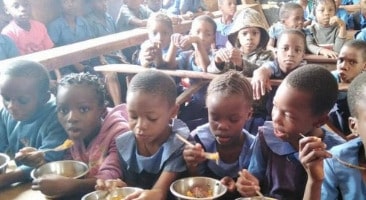Nigeria is creating a database of children’s biometrics ostensibly to increase transparency in a school meals scheme. The National Home Grown School Feeding Programme (NHGSFP) aims to have a win-win approach by boosting local food production and catering while providing meals to children to help them concentrate and attract them to school in the first place. Fingerprints and photos of children as young as five are being collected.
However, motives for collection are unclear while Nigerian media has reported on alleged corruption in the scheme which aims to spend N70 (US$0.17) per child per day for a meal and is already feeding 9 million children a day, at least on paper. The exercise has begun before Nigeria’s data protection law comes into effect and local media have reported technical issues with equipment as well as a surprising number of children turning up for registration.
The NHGSFP has been underway since 2016 with funding from various international donor organizations. The federal government funds meals for children in the first three years of primary school and state governments are tasked with continuing the scheme for children in the next three grades.
The scheme has already reached nine million children and the aim is to expand it to 15 million by 2023, according to Minister of Humanitarian Affairs, Disaster Management and Social Development, Sadiya Farouq, as reported by The Guardian. The minister announced the start of a biometric enrolment program for school children in Lokoja, a city between Lagos and the capital Abuja, although the reasons for the exercise are not clear except to confirm eligibility and form a basis for expansion.
Biometric capture of five- to eight-year-olds began in Borno State, also the epicenter of Boko Haram violence and fifteen official camps for internally displaced persons (IDPs). It is part of the Northeast Geopolitical Zone which has more than 2.2 million IDPs. A smaller four-state region including Borno is facing a cholera outbreak and requires $46 million in emergency food aid, according to the UN.
“The only challenge we are having is that initially, we planned for 112,500 beneficiaries in Borno but the figure based on updated data rose to 642,500 and so far we have only 55 registration tablets and expecting 212 other tablets at any moment from now that would go round the 27 LGA [Local Government Area],” said the Borno State consultant for the exercise, Alhaji Mohammed Alfa, as quoted by Vanguard.
“The good news I have for Borno is that this programme is supposed to be for 20 days but because of our peculiarities we have been given the opportunity to extend it beyond the 20 days,” said Alfa.
“Borno State is a peculiar state in terms of numerous challenges, insecurity and IDPs. These are bound to affect some of our plans, for example, the issue of IDPs children who were relocated from point A to B etc,” said Alfa, quoted by Voice of Nigeria. “But so far so good the biometric capture started last week; the exercise has been smooth even though we had a technical problem with the enrolment tablets.”
The outlet noted than children in years two and three were having their biometrics captured first, with younger year one children to follow. Borno State hopes better progress with 267 tablets to register the 642,000 children.
“In my five years journey as an education researcher, I have witnessed and read various challenges influencing the implementation of the feeding programmes in some of the schools benefiting from the programme across the six geo-political zones,” wrote Dr. Olasunkanmi Habeeb Okunola, postdoctoral fellow (Global Change Institute) at the University of the Witwatersrand in an op-ed for Vanguard.
“Investigations across these zones indicated that the programme is fraught with problems of large-scale corruption, irregularities, politicisation, poor quality control, lack of transparency and accountability,” wrote Okunal, citing issues such as the low budget and problems where existing vendors around schools were affected when contracts were awarded to other providers.
“We have been feeding pupils since 2016 but the data we have been dealing with is actually names of pupils sent by all the states. So this exercise will allow us go into the school, put faces and identities to these children by taking their details, their pictures and biometrics,” said Minister of Humanitarian Affairs, Disaster Management and Social Development, Sadiya Farouq, in a courtesy call to the governor of Nasarawa State, as quoted by Prompt News.
“The idea of the exercise is to prove that those we are feeding are actually human beings,” said Farouq, a possible acknowledgement of corruption.
Population is a highly political issue in Nigeria and the census particularly problematic. The best estimates put the current population somewhere above 207 million. Population means power as the number of seats a state has in the federal government is based on population. Counting children could be a way to extrapolate other population numbers.
HID Global is supplying biometric scanners – the DP4500. Children’s fingerprints are being collected via an enrolment app developed by Irish-Nigerian web developers Plovtech (whose own website does not seem conducive to selection for app development and whose social media channels advertise soya products).
Olatunde Immanuel, regional manager for Central and West Africa at HID Global said, “Our devices have been deployed to targeted schools in the six geopolitical zones in Nigeria to identify the properly enrolled beneficiaries qualified to take part in this incredible program.
“It’s projects such as this one that demonstrate how innovative global technologies like biometrics can be applied to support basic necessities – in this case, a daily meal to improve the well-being of children while boosting local economies.”
Article: Nigeria collects biometrics of elementary school children for meal program
